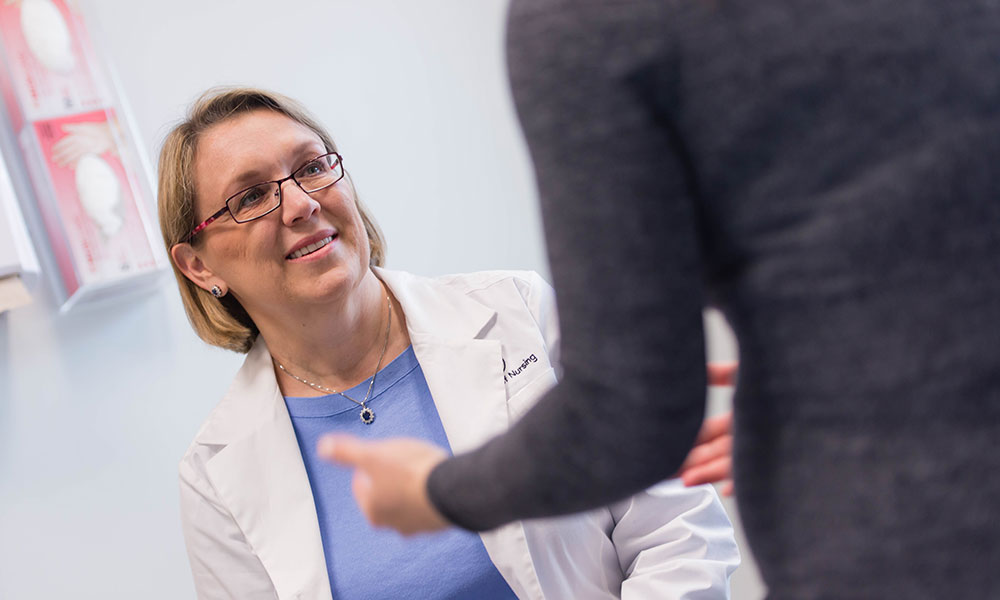Faculty Profile, People
Preparing the next generation of caregivers
October 20, 2017

About
Name
Marie Tarrant
Role
Director and Professor
School
Nursing
Faculty
Health and Social Development
Campus
Okanagan (Kelowna, BC)
Education
PhD, Public Health, Edith Cowan University, Perth, WA (2005)
Master of Public Health, Johns Hopkins University, Maryland, USA (2005)
Master of Nursing, University of Manitoba (1995)
BN, University of Lethbridge (1993)
Hometown
St. Lawrence, Newfoundland
“My goal is to simplify and provide the appropriate information to families and ideally see some of it adopted as public policy.”
HEALTH INFORMATION PRESENTED BY THE MEDIA is often controversial and confusing. Some details are true and others are exaggerated.
This calls for an investigator to sort out fact from fiction—enter, Marie Tarrant.
Tarrant is the Director of Nursing in UBC Okanagan’s Faculty of Health and Social Development, and she is looking out for moms and their children.
“Our digital world is swirling with information and new health claims, from avoiding vaccinating your children to the claims about super foods. It’s hard for new moms to sort through this material,” Tarrant says.
“My goal is to simplify and provide the appropriate information to families and ideally see some of it adopted as public policy.”
IMMUNIZATION IN THE COMMUNITY
Tarrant’s first exposure to an information gap was in the 90’s while providing care to Indigenous communities where vaccination rates were low. She thought this was odd given how frequently children visited their health-care professionals.
“Some of these children had come to the clinic up to 20 times for various reasons, and yet no one thought to immunize them,” she says. “To me, this was a missed opportunity and implied there was a lack of coordinated care.”
Tarrant pursued this reasoning in her Master’s thesis. She suggested there was a great window of opportunity to vaccinate children during their routine clinic visits, rather than asking families to make separate appointments at dedicated vaccination clinics.
“For many of the families, coming to one extra appointment was a challenge. Multi-tasking their appointments made sense and improved the immunization rate. Listening to all the various parties helped provide a solution.”
FROM PUBLIC HEALTH TO PANDEMIC
Proactive problem-solving was fulfilling for Tarrant and this led her to further explore public health research. A family-move to Hong Kong triggered the continuation of studies including a Masters of Public Health and doctoral research. Tarrant’s previous experience with immunization was used to help guide research during the H1N1 influenza pandemic.
Find out more about our MSN program
“Pregnant women are one of the highest at-risk groups for influenza because they can have serious complications if they become infected” Tarrant says. “Despite this, relatively few pregnant women were getting vaccinated.”
Tarrant embarked on a research study to determine why the women were not immunized. She found that in addition to the women’s hesitancy for vaccination, health-care professionals were also leery of the procedure.
She further determined that one-to-one education interventions increased vaccination rates yet the uptake was still low. On follow-up with the women, they discovered that some doctors refused to vaccinate or that the vaccines were unavailable.
“Even with the knowledge of benefits of vaccination, there still is this long-held belief that pregnant women should minimize exposing the fetus to any unknown substance, especially those injected into the body,” says Tarrant. “I believe this reluctance is common worldwide.”
More problem solving is needed to determine how to shift perceptions.
TOWARD THE BOTTLE AND EXPRESSED MILK
Looking at babies’ natural immunity is also a focus that Tarrant explored and continues to examine. Her particular interest is the evolving culture of breastfeeding.
“Breastfeeding is the unequalled method for feeding infants,” she says, adding that previous research has determined that breastfeeding is important for the nutrition, immunology, growth and development of infants and toddlers.
She has found that new moms are increasingly using expressed breast milk (either pumped or expressed by hand) instead of directly breastfeeding their babies. Her work also shows that these moms typically transition their babies to infant formula feeding sooner than their breastfeeding peers, a trend that may impact the health of our next generation.
Tarrant believes that a lack of breastfeeding support, either from the community or workforce, may be partly to blame for this feeding behaviour. She is currently evaluating the gaps with the hope to improve maternal support.
BACK TO BC
After almost two decades abroad, a PhD under her belt, and two children by her side, Tarrant was ready to come home to Canada—and UBC was the institution of her choice. As Director of the School of Nursing, she is enthusiastic about preparing the next generation of caregivers with the best and most accurate knowledge.
“I was very impressed with the nursing program at UBC Okanagan; it delivers a very high-quality education. Our graduates are outstanding nurses whose knowledge and skills are highly valued within BC and across Canada. My aim is to maintain this while ensuring that our students are innovative, creative, evidence-informed problem-solvers who can collaboratively lead interprofessional teams.”
Through training and research, Tarrant aspires to teach the next generation of nurses—and by extension, their patients—to be more proactive about public health.
—by Christine Zeindler